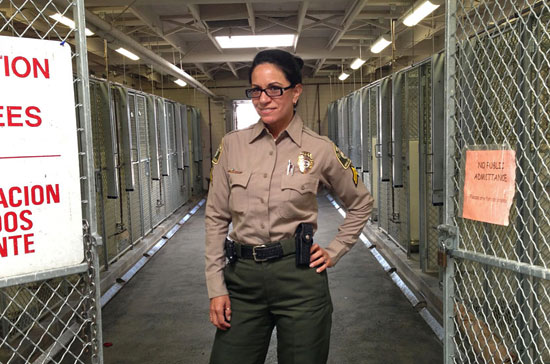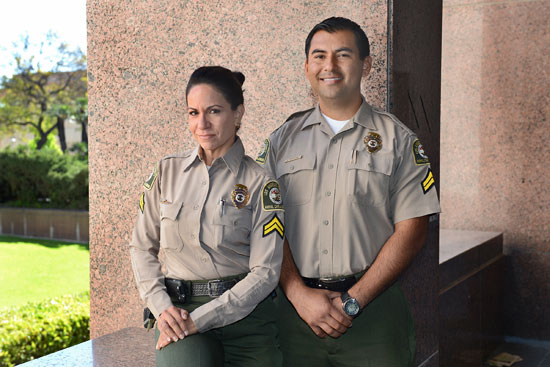Taking a bite out of animal cruelty
April 11, 2013

Abusers beware: Eva Montes and her crack team in the county animal control department are on the case.
What began 15 years ago simply as a promising job for a struggling single mom of three youngsters, has become a calling. “I am a voice for the animals,” says Eva Montes.
Those animals have come in all sizes and shapes, from furry to feathered, but they’ve suffered a common fate: they’ve been treated badly by people—sometimes through ignorance, sometimes with malice. And it’s not just about the animals.
“Most serial killers started with abusing animals,” Montes says, “and we have to put a stop to that early.”
Montes belongs to a select squad inside Los Angeles County’s Department of Animal Care & Control that investigates the agency’s most complex cases of animal neglect and cruelty. Called the Major Case Unit, its seven members tackle everything from highly organized pit bull and cockfighting rings to cat hoarders to single cases of heartbreaking—and criminal—abuse.
On Tuesday, she was among more than a dozen uniformed colleagues picked to represent the department before the Board of Supervisors as part of “Animal Control Officers Appreciation Week in Los Angeles County.” While the agency is best known for its shelter system and efforts to find adoptive homes for animals, the largely unsung detective work of its Major Case Unit, or MCU, is central to the agency’s mandate.
“By our very mission, we’re charged with protecting the public and protecting animals,” says Deputy Director Aaron Reyes, who oversees the unit. “One of the best ways we can do that is to investigate crimes of cruelty, abuse, neglect and illegal animal fighting.”
Reyes says the MCU was created more than a decade ago when it became clear that the massive volume of calls handled by animal control officers was preventing them from undertaking sustained and difficult investigations. Until last year, the MCU had been based in the original “pound master’s house” at the department’s first-ever facility, which opened in Downey in 1946. But Reyes says he thought it was crucial to get the team’s members “onto the front lines” and base them in various shelters, where they could initiate investigations more quickly and share their expertise and insights with other officers.
The idea to scatter the team was not met with enthusiasm.
“We were against it,” recalls Montes, who’s been in the unit for nearly three years. “We hung out together. We were family. But it’s worked out better.” Since being assigned to the Carson Animal Care Center, Montes says, she’s found potential abuse cases “that were slipping through the cracks” because some officers were not creative enough in their investigations or sufficiently trained to spot signs of less obvious abuse or neglect when people were bringing dogs to the shelter.
Since last July, Montes says she has, for the first time, initiated a number of investigations of people who’ve brought dogs to the facility, including a woman who recently turned in a pit bull that looked like it had been used for fighting. A warrant for her arrest was recently issued. Last November, Montes was instrumental in a joint investigation with the SPCA Los Angeles that led to a long list of cruelty charges filed by the district attorney’s office against the owner of a Gardena guard dog business.
Being assigned fulltime to the Carson shelter, which serves some of southern Los Angeles County’s most impoverished neighborhoods, has been a culture shock for Montes. Before her promotion to the MCU, she spent nine years in the county’s Agoura Animal Care Center, high in the mountains above Malibu. She calls it “the Club Med of shelters.” The dogs, she says, are mostly of the “frou-frou” variety, and volunteerism is robust, something for which she’ll always be grateful on a very personal level. During Montes’ tenure there, her 14-year-old daughter died from a form of bone cancer. Volunteers built a misting system to keep the animals cooler during the summer months and dedicated it with a plaque in honor of Montes’ daughter, Jessica.
“She really respected my job,” Montes says of her girl. “If she could only see me now.”
In contrast to the Agoura shelter, Montes’ current assignment has exposed her to some of the meanest dogs and toughest owners in the department’s jurisdiction, a swath of southern Los Angeles County where “gang members represent themselves with their dogs.” Sometimes, she says, packs of “dominant breed” dogs such as Rottweilers and pit bulls roam the streets. “It’s scary,” she says. “I worry about getting bit and never being able to work again.”
Montes says she’s received cooperation during her neighborhood investigations but has been told by some male officers that they’ve encountered resistance when responding to complaints, being warned: “Get off my property or I’ll shoot you.”
One of Montes’ colleagues in the Major Case Unit is Armando Ferrufino, who, like her, also works in the southern part of the county. An expert on cockfighting, he’s assigned to the Downey Animal Care Center. And like Montes, he also feels as though he’s a voice for the animals.
He tells the story of a man who, for months, allowed his Rottweiler, Duke, to deteriorate into a mass of tumors and sores, refusing to seek medical help despite the animal’s obvious suffering. Acting on a tip, animal control officers rescued Duke, but he was too far gone to save.
“I felt like the spirit of the animal was telling me to do the right thing, to investigate and get the whole truth,” Ferrufino says. “And I did.” The owner was charged with a felony and sentenced to three months in county jail.
Ferrufino, who joined the MCU in 2009, says one of the most sensitive assignments involves animal hoarders, mostly lonely elderly people whose homes are filled with scores of cats, a good number of them ailing. “In their mind,” Ferrufino says, “they believe they are doing the right thing—showing them love—but it gets to the point where they can’t take care of them.”
If the neglect is severe, he says, then charges are pursued. Authorities also provide referrals for counseling. What’s more, the county has a program to help clean homes after animals have been removed during often tearful negotiations with owners. “It’s an illness,” Ferrufino says. “They’re not aware they’re doing something wrong.”
As difficult and wrenching as the work can be, Ferrufino says, he’s found his calling, too.
“Every day I come to work, I’m happy,” he says. “You don’t know what’s going to happen next, from hoarders to horses to cockfights.”
Montes agrees. “Some people like to stay in the shelter environment. But I saw other officers out there getting justice and I said: ‘That’s what I want to do.’ “
Posted 4/12/13













 405 bridge work causes a stink
405 bridge work causes a stink
